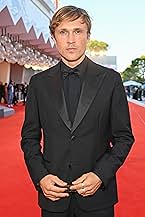La storia di un ragazzo nella tumultuosa Napoli degli anni Ottanta. Una vicenda costellata di gioie inattese e una tragedia altrettanto inattesa. Il destino trama dietro le quinte e gioia e ... Leggi tuttoLa storia di un ragazzo nella tumultuosa Napoli degli anni Ottanta. Una vicenda costellata di gioie inattese e una tragedia altrettanto inattesa. Il destino trama dietro le quinte e gioia e tragedia s'intrecciano.La storia di un ragazzo nella tumultuosa Napoli degli anni Ottanta. Una vicenda costellata di gioie inattese e una tragedia altrettanto inattesa. Il destino trama dietro le quinte e gioia e tragedia s'intrecciano.
- Candidato a 1 Oscar
- 32 vittorie e 66 candidature totali
Betty Pedrazzi
- Baronessa Focale
- (as Betti Pedrazzi)
Recensioni in evidenza
For a reason I could never understand, everyone expected a "Rome" from Sorrentino. And out of every 5 reviews written about this movie, 4 of them mentioned the movie 'ROMA'.
Sorrentino made his own 'È stata la mano di Dio' rather than his own Rome, and he did it well.
I didn't want to watch this movie without a proper copy, when Netflix came to my rescue.
It was a beautiful film with everything from its editing to the role its screenplay plays in storytelling, from the angle choices of the cinematographer to the sometimes exaggerated and everywhere calm performances of the actors.
It's been a long time since I heard Italian "in a good sense" in the cinema.
And it was worth the wait.
Sorrentino made his own 'È stata la mano di Dio' rather than his own Rome, and he did it well.
I didn't want to watch this movie without a proper copy, when Netflix came to my rescue.
It was a beautiful film with everything from its editing to the role its screenplay plays in storytelling, from the angle choices of the cinematographer to the sometimes exaggerated and everywhere calm performances of the actors.
It's been a long time since I heard Italian "in a good sense" in the cinema.
And it was worth the wait.
It's been a long time since I've seen a great italien film, and i always say this "Sorrentino is the closest we're ever gonna have to Fellini". One of the realest, saddest and funniest movies of 2021!
"Cinema is a distraction, reality is second-rate." Fellini (overheard in in this movie)
As Oscar-winning director Paolo Sorrentino's stand-in, Fabietto (Filippo Scotti), comes of age in The Hand of God, he experiences the vagaries and beauties of Neapolitan life, not the least of which is his growing love of cinema. While half way through he will experience a life-changing tragedy, he will throughout be an observer of Naples with its Fellini-like freaks and gorgeous gulf-coast scenery. In a way, this is Sorrentino's Amarcord.
The Hand of God is a title derived from the description of soccer god, Diego Maradona, and his magical, controversial goal in the 1986 World Cup quarterfinal. It also could refer to the Sistine Chapel's fingers, and many other references that bolster this luminous description of Sorrentino's early life in Naples.
When Fabietto sees his aunt, Patrizia (Luisa Ranieri), naked on occasion, Sorrentino shows the emerging appreciation of sexuality in a young-man's sensibility and the parallel lushness of Italy, whose food is legendary and sensuality eternal. Both his older brother Marchino (Marlon Joubert) and he are transfixed by the eroticism, which undoubtedly creeps into all of Sorrentino's work.
Patrizia fuels the erotic fantasies of Fabietto and his older brother Marchino (Marlon Joubert), an aspiring actor too conventionally handsome to be of interest to the great Fellini.
It's as if Sorrentino is saying that these images helped him form his cinematic persona and lifelong affection for his youth in a culturally-rich country. The appearance of a Neapolitan folklore hero, a child monk in a sumptuous palazzo with a deteriorating chandelier, is just one of the many images Sorrentino uses to emphasize the wealthy culture he grew up in.
In addition to the tragedy, Fabietto is most moved by an encounter at a shoot in the historic Galleria Umberto I with director Antonio Capuano (Ciro Capano), his future mentor, who explains cinema with a hard-nosed philosophy that incorporates individuality as the driving force. Upon giving himself to courage and perseverance, as director Capuano advises, Fabio will be a hope of Italian cinema, incorporating the lyrical jumble of happy images from his tender youth to the contemplative awareness in his growing years.
From the Felliniesque characters of his youth-circus-like fat women, goddess-like nymphs, and bold friends like Armando (Biaggio Manna-a John Belushi type), Fabio will break the bounds of domestic life and teen-age longings to strike out into a cinematic world that promises to be at least a distraction rather than a second-rate experience.
Sorrentino has been touched by the hand of God.
As Oscar-winning director Paolo Sorrentino's stand-in, Fabietto (Filippo Scotti), comes of age in The Hand of God, he experiences the vagaries and beauties of Neapolitan life, not the least of which is his growing love of cinema. While half way through he will experience a life-changing tragedy, he will throughout be an observer of Naples with its Fellini-like freaks and gorgeous gulf-coast scenery. In a way, this is Sorrentino's Amarcord.
The Hand of God is a title derived from the description of soccer god, Diego Maradona, and his magical, controversial goal in the 1986 World Cup quarterfinal. It also could refer to the Sistine Chapel's fingers, and many other references that bolster this luminous description of Sorrentino's early life in Naples.
When Fabietto sees his aunt, Patrizia (Luisa Ranieri), naked on occasion, Sorrentino shows the emerging appreciation of sexuality in a young-man's sensibility and the parallel lushness of Italy, whose food is legendary and sensuality eternal. Both his older brother Marchino (Marlon Joubert) and he are transfixed by the eroticism, which undoubtedly creeps into all of Sorrentino's work.
Patrizia fuels the erotic fantasies of Fabietto and his older brother Marchino (Marlon Joubert), an aspiring actor too conventionally handsome to be of interest to the great Fellini.
It's as if Sorrentino is saying that these images helped him form his cinematic persona and lifelong affection for his youth in a culturally-rich country. The appearance of a Neapolitan folklore hero, a child monk in a sumptuous palazzo with a deteriorating chandelier, is just one of the many images Sorrentino uses to emphasize the wealthy culture he grew up in.
In addition to the tragedy, Fabietto is most moved by an encounter at a shoot in the historic Galleria Umberto I with director Antonio Capuano (Ciro Capano), his future mentor, who explains cinema with a hard-nosed philosophy that incorporates individuality as the driving force. Upon giving himself to courage and perseverance, as director Capuano advises, Fabio will be a hope of Italian cinema, incorporating the lyrical jumble of happy images from his tender youth to the contemplative awareness in his growing years.
From the Felliniesque characters of his youth-circus-like fat women, goddess-like nymphs, and bold friends like Armando (Biaggio Manna-a John Belushi type), Fabio will break the bounds of domestic life and teen-age longings to strike out into a cinematic world that promises to be at least a distraction rather than a second-rate experience.
Sorrentino has been touched by the hand of God.
A brilliant piece of filmmaking that totally took my breath away. This feels a lot personal because it is. Sorrentino created this film with an enormous love and you just feel it. His use of camara is outstanding, applying a lot of different techniques to give us some really beautiful shots and scenes, all of them unforgettable.
The first hour is magic. I laughed more than in most comedies I've seen. I was totally in awe with all those fascinating and lively characters. Everything feel so alive, so real. The sense of community is palpable.
The second hour is emotionally brutal. Sorrentino doesn't want to stay for a long time on overdramatic scenes. Just the necessary to tell his story. But he does it through powerful images and with a lot to say.
Even if this film is personal to the director, I believe this will feel familiar to a lot of us and that is the beauty of the cinema: a personal individual story can touch many people. Great homage to Napoli and cinema in a fantastic coming of age film.
The first hour is magic. I laughed more than in most comedies I've seen. I was totally in awe with all those fascinating and lively characters. Everything feel so alive, so real. The sense of community is palpable.
The second hour is emotionally brutal. Sorrentino doesn't want to stay for a long time on overdramatic scenes. Just the necessary to tell his story. But he does it through powerful images and with a lot to say.
Even if this film is personal to the director, I believe this will feel familiar to a lot of us and that is the beauty of the cinema: a personal individual story can touch many people. Great homage to Napoli and cinema in a fantastic coming of age film.
It is a very difficult challenge to try to lightly tell such a personal and traumatic drama as it happens in "The hand of God". The director Sorrentino tries to face it without veils and metaphors, keeping only his very personal taste for the grotesque and decadence because- as he tries to explain several times in the film- after the personal tragedy he experienced as a teenager, he no longer likes reality: "the reality is poor". Yet reality can also be extraordinary, so much so as to generate one of the best contemporary Italian directors from a such atrocious trauma.
Lo sapevi?
- QuizAccording to Paolo Sorrentino, it was Alfonso Cuarón's Roma (2018), which was based on Cuaron's childhood in Mexico City, that gave Sorrentino permission to commit his own experience to film. For Sorrentino realized that "a personal, private film could tell a universal story."
- Citazioni
Antonio Capuano: Remember, those without courage don't sleep with beautiful women.
- Colonne sonoreNapule è
Written and performed by Pino Daniele
I più visti
Accedi per valutare e creare un elenco di titoli salvati per ottenere consigli personalizzati
- How long is The Hand of God?Powered by Alexa
Dettagli
- Data di uscita
- Paesi di origine
- Sito ufficiale
- Lingue
- Celebre anche come
- Fue la mano de Dios
- Luoghi delle riprese
- Aziende produttrici
- Vedi altri crediti dell’azienda su IMDbPro
Botteghino
- Budget
- 13.049.974 € (previsto)
- Lordo in tutto il mondo
- 167.909 USD
- Tempo di esecuzione2 ore 10 minuti
- Colore
- Mix di suoni
- Proporzioni
- 2.39 : 1
Contribuisci a questa pagina
Suggerisci una modifica o aggiungi i contenuti mancanti

Divario superiore
What was the official certification given to È stata la mano di Dio (2021) in Canada?
Rispondi

































